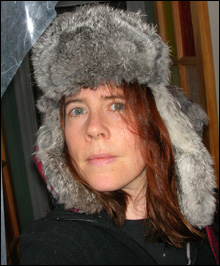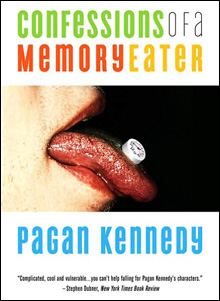
IDENTITY CRISIS: Memory literature meets drug literature in Kennedy’s latest. |
VH1 is only the latest venue to remind us that the nostalgia niche is a powerful market. The “remember that?” premise lures us with the promise of the way we were, re-experiencing ourselves in the golden glow of Depeche Mode and slap bracelets. Pagan Kennedy, Somerville writer and ex-zinester, offers her own take on this urge to re-experience the past in her latest novel, Confessions of a Memory Eater.Eschewing TV’s manipulative cheap tricks, Kennedy invents a drug that allows people to access memories and refeel them, in the process raising larger questions about identity. Who (or perhaps when) is your true self? Is the realest you the one who lives in the present moment? Or is it the person you once were, at eight, at 27?
The author, who’s written seven other books of fiction and narrative non-fiction (most recently Black Livingstone, which made the 2002 New York Times Notable Books list), here inserts herself into the tradition of memory literature (Proust, Woolf, Toni Morrison) and drug literature (Huxley, Wolfe, Castaneda). She's said that she considers herself more of a non-fiction writer, and it makes sense that her latest book is speculative fiction. Better yet to think of it as a kind of future non-fiction — it’s fiction now, but maybe not for long. She anticipates the addictive force of shining a spotlight beamed on some part of your past self. Granted: when this drug does exist, people will take it. But how does full access to all memories alter the way we exist in the present moment?
Win Duncan, an English professor at a middling college in New Hampshire, faces a classic midlife crisis. His marriage has deteriorated; his research on Confessions of an Opium Eater author Thomas DeQuincey is at a standstill. He’s consumed with the sense that “I did not belong in my own life” with a “wife who ignored me, a job that bored me, a landscape of winter highways where snow spit down on the gray dome of cars.”
Things change when he gets a call from an old grad-school pal, Phil Litminov, who’s got urgent news about a new drug he’s designed. Win rushes down to New York, tries the pill, and becomes addicted to the young, ambitious, in-love Win of his late 20s. "When you're on the drug, you do not so much ‘remember’ as perch inside your former self.” He waxes professorial: “On Mem, you become several different selves collaged together, mixed up like samples on a hip-hop album. It lets you understand that there’s no unity to consciousness, only bricolage. It’s the most postmodern of drugs.”
 |
Win’s motivations for experimenting with Mem, are, on the surface, shallow and ego-driven: he's a middle-aged man wanting to get back to his vital youth. The crazed Litminov uses Mem to conquer past trauma by facing it again. Sue, another Mem tester, is dying of cancer; she uses the drug as a painkiller, a prosthetic. It gives her back her breast; it allows her to return to her best self, not the shell of a human sick and pained. Mem’s power lies in reversing time. “Without the drug, you have to die by plunging forwards, into the horrible future where you will not exist. But with Mem . . . you can die by going backwards into your mother’s lap, and then into the whoosh, whoosh, whoosh of her womb, and out the other side. Death can be a place you already know. . . . ”But Win’s not dying, and he finds that on the drug or off, time alters memories, and Mem renders the present pale. Kennedy leaves the question open as to whether that’s a miraculous thing or an insidious one. In the meantime, she dramatizes the elements of time, memory, and identity in all their fluid dynamics.